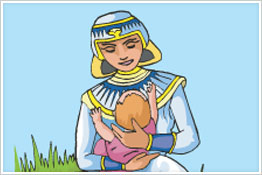The Impact of Moral Courage
By Marjorie Foerster Eddington
How important is moral courage? First, let's clarify the term. Moral courage is the bravery and endurance to stand for principle in the face of danger. Now, let's look at a biblical example that is relevant to this day.
 Imagine that it's about 3200 years ago, and the Hebrew people have grown in number and prosperity in Egypt. The Pharaoh, who does not like this one bit, makes sure the Hebrews are severely oppressed. Then, he tries genocide: Pharaoh orders all his people to throw newborn baby Hebrew boys into the Nile (Ex 1:22). Imagine that it's about 3200 years ago, and the Hebrew people have grown in number and prosperity in Egypt. The Pharaoh, who does not like this one bit, makes sure the Hebrews are severely oppressed. Then, he tries genocide: Pharaoh orders all his people to throw newborn baby Hebrew boys into the Nile (Ex 1:22).
Into this environment, a Hebrew boy is born. Imagine: You are a Hebrew; what do you do? You are an Egyptian; what do you do?
Three women – two Hebrews and one Egyptian – faced this question and answered on the same side. Their moral courage enabled an entire people to be rescued from the bonds of slavery.
The Mother
When this Hebrew woman gave birth to a son, she was legally required to throw him into the Nile River. But this mother (whom we later find out is named Jochebed) saw that he was a fine, good boy. The wording used to describe her son is the same phrase used in Genesis when God saw everything created and "it was good" (The Harper Collins Study Bible 86). The mother saw the innate, God-given goodness in her son. Would that we all had the same spiritual intuition!
Then, she exhibited extraordinary moral courage. She had slave status – no rights, no protection. She could have easily been tortured and/or killed for disobeying the law. In the face of certain terror, she disobeyed the law. She hid her baby for as long as she could. After three months, she made a little basket for him – an ark, like Noah's ark, only smaller. Neither ark had a rudder; neither ark had a way to guide it. God was the guide and protector.
She sent her son off in a rudderless basket, not knowing what would happen to him. Perhaps she had only prolonged his certain death – an accident could happen, or an Egyptian could find him and throw him into the Nile. In the face of uncertainty, she trusted God.
The Rescuer
An Egyptian did find the baby boy. In fact, this Egyptian was none other than Pharaoh's daughter (Ex 2:5). Instead of responding with the hatred of her father, "she had compassion on him [the baby]" (Ex 2:6 KJV). She knew he was a Hebrew baby. Yet, she did not abandon the boy or deliberately drown him – despite her father's decree.
What moral courage to stand up not only to her father, but to the king! What's more, Pharaoh's daughter basically adopts this baby, raising him as her own son, and naming him Moses. He grew up as an Egyptian, among the Egyptians, and must have been known to Pharaoh. He certainly received a good education and learned to speak Egyptian, all of which would serve him later.
The Sister
The baby's sister (whom we later find out is named Miriam) also displayed moral courage. She had inconspicuously followed the basket as it drifted down the Nile. After Pharaoh's daughter recognized the boy as Hebrew, the boy's sister makes herself known. Risking her own well-being for her brother's sake, Miriam asks, "Shall I go and get you a nurse from the Hebrew women to nurse the child for you?" (Ex 2:7). She has no clue how the princess will respond. She could have easily been beaten. But the Egyptian princess says yes, and the sister gets her mom to be the nurse. Not only did the mother get to nurse her son, but she also got paid by Pharaoh's daughter to do so. What a blessing to Moses' family!
Had it not been for the moral courage of these three women of various ages, ethnicities, and vastly different social standings, Moses never would have grown up to lead his people to freedom (The Exodus), write down the Ten Commandments from God (which are foundational to the Jewish and Christian religions), establish the law, teach the millions of wanderers in the desert all about God's love for them, and prepare them to enter the Promised Land.
Their brave acts didn't just affect their own lives; they influenced the course of history. We may not know what the impact of our decisions will be, but based on this example, we can rest assured that if we make the morally courageous choice, blessings will follow.
So how important is moral courage? Important enough to liberate lives. |

